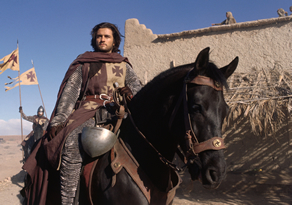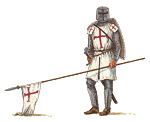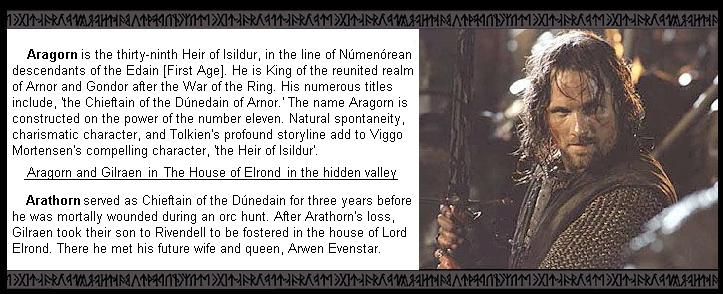The crystal [sometimes moonstone] sphere is a symbol of the Monad. The name "Pan" means "All" and some believe that Pan was originally a much more powerful, all-encompassing god who got downsized with the advent of the Olympians. Less well-known tales give him powers as a sea-god with the epithet Haliplanktos, as a healer of epidemics through cures revealed in dreams, as an oracle-god, and other aspects. Certain broad statements have been laid down concerning the rotation of matter, and the results produced in diverse spheres by that rotation. Usually, the relationships involved are studied as part of the dowsing theory of energy management. The master of white metal and black metal could be considered an adept with the knowledge of such formulae.

KINGDOM OF HEAVEN Homepage
The spiritual ore associated with Mars, that of iron, steel, and others, rules Christianity. It is a religion of nobility, devotion, fanaticism, of high courage and idealism. The ore of Mars, in its best relationship with the Moon, the spiritual ore of silver, represents knowledge of universal, shared spiritual truths, present in the theology of all religions. The Mars-Moon ratio determines the volume of power and the spiritual vision available via each individual paradigm linked to our collective relationship with the created universe.
Review: Kingdom of Heaven
...we almost expected that Scott would fictionalize his tale somewhat; but the question remained: to what extent would fiction mix with "fact"? To Scott’s credit, and to my surprise, Kingdom manages a balanced and credible treatment of the historic tensions which led both to the Crusades themselves and to the end of the short-lived and precarious peace which Jerusalem did in fact enjoy under the reign of King Baldwin. And the very real historic person of Balian of Ibelin provides Scott with the perfect opportunity to generalize one man’s experience into Every Man’s familiar and troubling quest."
Why does a Crusader go to Jerusalem? If Ridley Scott’s somewhat fictionalized Balian of Ibelin supplies any answer, it’s this: a Crusader goes to Jerusalem not due to a clear conscience before God, but just the opposite. The protagonist of Kingdom of Heaven goes because he’s a miserable, disillusioned transgressor. He goes to Jerusalem hoping to find forgiveness and the hand of God. But what does he actually find?
Director Ridley Scott is the master of epic cinematic storytelling with a deeply personal core, as he has shown in films like Gladiator, Blade Runner, and Black Hawk Down. In KINGDOM OF HEAVEN he now turns to the Crusades -- that world-shaping 200-year collision between Europe and the East -- to frame the tale of a young Frenchman who discovers his destiny as a knight, then lives out what that glorious title really means.
Orlando Bloom stars as Balian, a blacksmith who has lost his family and nearly lost his faith. The religious wars raging in the far-off Holy Land seem remote to him, yet he is pulled into that immense drama. Amid the pageantry and intrigues of medieval Jerusalem he falls in love, grows into a leader, and ultimately uses all his courage and skill to defend the city against staggering odds.
Destiny comes seeking Balian in the form of a great knight, Godfrey of Ibelin (Liam Neeson), a Crusader briefly home to France from fighting in the East. Revealing himself as Balian’s father, Godfrey shows him the true meaning of knighthood and takes him on a journey across continents to the fabled Holy City.
Full article, international trailers & clips @
Hollywood Jesus
STYLUS MAGAZINE
Review by: Jay Millikan
Kingdom of Heaven
A young man’s dreams. A sacred quest. The highest of stakes. Epic battles, with the defeated laying slain on the battlefield. And a scandalous sexual relationship that threatens to rip apart the fabric of the community.
... The story’s central character is Balian (Orlando Bloom), a young French blacksmith so grief-stricken at his wife’s suicide that he impulsively kills a loudmouthed priest convinced her soul is hell-bound. Oops. Luckily, Balian’s long-lost father (Liam Neeson) is in town to recruit his son for the Crusades, and he’s, you know, a powerful knight and all, so Balian has a convenient method of escape from the inevitable angry mob that prefers its theologians to be more or less alive. Prior to his inevitable death, Papa Knight convinces Balian that Jerusalem is a place for a poor young man to make his mark, in contrast to France, whose primary export in this film seems to be clouds of swirling snow.
... it is beautifully shot and sufficiently action-packed to elicit words of praise for Ridley Scott [legend has it:
Sun 7° Sagittarius 53' - Luna in Scorpio, with Destiny Path 7], and is intelligently written enough to separate itself from some of its mediocre-to-awful predecessors. If Hollywood is going to keep making these sorts of films, let us hope they’re all as thoughtful as Kingdom of Heaven.
Full article
Friday the 13th and The Crusades
The Knights Templar were a monastic military order founded in Jerusalem, in the year 1118. Their terrible fate delivers to everyone a prime example* as to the founding fathers' reason for separation of church and state. Philip IV symbolizes tyrannical Kings, and Pope Clement V symbolizes ambitious religious leaders. The complex relationship between Philip IV and Clement V resembles the 'big city, big bucks' arrangement in the third installment of The Godfather trilogy.
Paraskevidekatriaphobia, or fear of Friday the 13th, is the most widespread superstition in America today, and the favourite day not to have weddings! This foreboding reputation dates back to the infamous Oct.13, 1307, when a church-state conspiracy was launched against the order of warrior monks, known as Knights Templar.
Their complete descimation, as with that of the French Cathers, is the longtime fear of people charged with protection of the mainstream population in the United States. Keep in mind the Court of the Inquisition is adjourned, it was never ended as a judicial body.
The great chaos of Christianity, known as the "Babylonian captivity of the papacy" [tragedy of three Western Popes and the Eastern Orthodox Pope] was originally brought about because King Phillip IV of France wanted the wealth of the Templars to pay for the Crusades. The atmosphere that prevailed influenced the arrest, failure to ransom, the torture and execution of
St. Joan of Arc. Joan and her entire village remained faithful to the Roman Pope during the war with England.
At dawn on Friday, October 13, 1307, armies were sent marching with the sealed royal order to Phillip's bailiffs they should open their orders and execute them exactly. We could almost superimpose this surreal scene of the Templars' betrayal on Star Wars III Revenge of the Sith, when the Emperor issues 'general order 66' to the clone army that they cut down all Jedi in their area.
Fear of the number 13 is known as triskaidekaphobia and can be traced to ancient Rome and earlier. Prior to the warrior pantheon the number 13 was considered lucky, or at least a favorable omen [the twelve tribes camped around the Ark of the Covenant].
Modern nursery rhymes often refer to the 'dangerous influence' as the 13th fairy not invited to the banquet, as in Sleeping Beauty. Look back to the beginning of the legend about 'the Golden Apple', ancient Troy and the Judgment of Prince Paris. The origin of the Trojan War is said to be due to a failure to invite the goddess who would be most offended to a marriage feast. She made an appearance, just long enough to throw a golden apple into the room full of guests. The writing on the apple read, "For The Fairest".
note that recently, reconstructions of the ancient sky show the Odyssey eclipse that
dates the fall of Troy itself to precisely 1188 BC.
 Additional sources:
Additional sources:
The Crusades
El Cid
First Knight Go to FANPAGE for Sean Connery
Indiana Jones and The Last Crusade go to FANPAGE for
Shaman, Shaker, Medicine Man and
Harrison Ford
Review: Roger Ebert KINGDOM OF HEAVEN
Sly philosophic battlefield:
The Matrix [The Oracle and The Architect] - go to FANPAGE for
THE MATRIX
Ridley Scott comments @ "The Wall", an energy management page, re Blackhawk Down
Spy Game go to FANPAGE for Robert Redford Spy Game

E L I Z A B E T H T O W N


Orlando spoke about his skyrocket rise to cinematic star status in teenvogue: "No one would have turned down the roles I landed. And I liked getting into a costume and performing – to me that’s what acting was."
…Shooting in small-town America was, for the actor, a revelation, but he wryly notes that the same could be said of his entire Elizabethtown experience. "It was all kind of new. I didn’t have a sword, for one thing. Perhaps with this movie people will see something sort of comic and emotional and real and different a bout me. I’m into doing more of that."
Wardrobe Mistress: Nancy Steiner
Elizabethtown takes place over several days—so, true too life, wardrobing options were limited. With ten style changes for the Claire Colburn [Kirsten Dunst] role and even less for Drew Baylor [Orlando Bloom], Nancy shopped for both at swap meets, vintage stores, designer showrooms – and even her own closet…
Interestingly, Claire’s red beret was a clever visual devise conjured up by writer, director Cameron Crowe to help Drew spot her. Drew may have had several changes, but his wardrobe consisted of just one suit, a couple of shirts, and some clothing he picked up on his journey. As for shoes: Just one pair of beat-up boots.

In 1305, the new Pope Clement V, based in France, sent letters to both the Templar Grand Master Jacques de Molay and the Hospitaller Grand Master Fulk de Villaret to discuss the possibility of merging the two Orders. Neither was amenable to the idea, but Pope Clement persisted, and in 1306 he invited both Grand Masters to France to discuss the matter. De Molay arrived first in early 1307, but de Villaret was delayed for several months. While waiting, De Molay and Clement discussed charges that had been made two years prior by an ousted Templar. It was generally agreed that the charges were false, but Clement sent King Philip IV of France a written request for assistance in the investigation. King Philip was already deeply in debt to the Templars from his war with the English and decided to seize upon the rumors for his own purposes. He began pressuring the Church to take action against the Order, as a way of freeing himself from his debts.
On Friday, October 13, 1307 (a date sometimes linked with the origin of the Friday the 13th superstition)
Philip ordered de Molay and scores of other French Templars to be simultaneously arrested. The arrest warrant started with the phrase : "Dieu n'est pas content, nous avons des ennemis de la foi dans le Royaume" ["God is not pleased. We have enemies of the faith in the kingdom"]. The Templars were charged with numerous offences. Many of the accused confessed to these charges under torture, and these confessions, even though obtained under duress, caused a scandal in Paris.
All interrogations were recorded on a thirty meter long parchment, kept at the "Archives nationales" in Paris. The prisoners were coerced to confess that they had spat on the Cross, and other such capitol crimes. The parchment mentions a red, monochromatic image of a man on linen or cotton, qualified as an idol by the interrogators. This suggests the presence of the Shroud of Turin. In 1307 few people knew of its whereabouts. After the sack of Constantinople by the Fourth Crusade in 1204, the Shroud, that had been in the possession of the Emperor, disappeared for about one century. It reappeared in the small town of Lirey, in the Champagne region of France around the years 1353 to 1357 in the possession of Geoffroy de Charny and later in Chambéry in the possession of the Duke of Savoy.
As for the leaders of the Order, the elderly Grand Master Jacques de Molay, who had confessed under torture, retracted his statement. His associate Geoffroi de Charney, Preceptor of Normandy, followed de Molay's example and insisted on his innocence. Both men were declared guilty of being relapsed heretics, and they were sentenced to burn alive at the stake in Paris on March 18, 1314.




